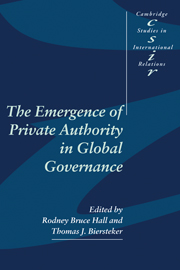Book contents
- Frontmatter
- Contents
- List of figures
- List of tables
- List of contributors
- Preface and acknowledgements
- Part I Introduction: theorizing private authority
- Part II Market authority: globalization and “globaloney”
- 3 Economic governance in an electronically networked global economy
- 4 Global finance, political authority, and the problem of legitimation
- 5 The state and globalization
- Part III Moral authority: global civil society and transnational religious movements
- Part IV Illicit authority: mafias and mercenaries
- Part V Conclusions and directions
- Bibliography
- Index
- CAMBRIDGE STUDIES IN INTERNATIONAL RELATIONS
4 - Global finance, political authority, and the problem of legitimation
Published online by Cambridge University Press: 22 September 2009
- Frontmatter
- Contents
- List of figures
- List of tables
- List of contributors
- Preface and acknowledgements
- Part I Introduction: theorizing private authority
- Part II Market authority: globalization and “globaloney”
- 3 Economic governance in an electronically networked global economy
- 4 Global finance, political authority, and the problem of legitimation
- 5 The state and globalization
- Part III Moral authority: global civil society and transnational religious movements
- Part IV Illicit authority: mafias and mercenaries
- Part V Conclusions and directions
- Bibliography
- Index
- CAMBRIDGE STUDIES IN INTERNATIONAL RELATIONS
Summary
The exercise of political authority through market mechanisms is not a new phenomenon. The question of the extent to which such authority at the global level becomes “privatized” in the contemporary era is, however, a novel and important one. This chapter seeks to advance debate on that question by offering an interpretation of recent developments in international financial markets.
Power and authority in integrating markets
Mainstream economists now routinely express their puzzlement at the rise and rapid expansion of “anti-globalization” protest movements around the world. If the protestors would only learn some basic economics and a little Ricardian trade theory, we often hear, they would realize that the costs of international interdependence and even deepening integration are overwhelmed by the benefits. It is, however, becoming very hard to believe that simple ignorance is driving a spreading reaction to global change. Mass demonstrations sweeping through relatively prosperous cities like Seattle, Washington, D.C., Quebec City, and Genoa in the early years of the twenty-first century reflected broad agenda-defining coalitions among a variety of not necessarily convergent interests. But they also suggested something deeper. Certainly protestors commonly claimed that corporate power and vested interests were usurping public space and dictating the agenda for public policy, that elected governments actually charged with making policy were becoming powerless, and that an ideology of free market individualism was eroding social cohesion around the world. At the systemic level, their concerns seemed to center on what we might call the constitution of international political authority.
- Type
- Chapter
- Information
- The Emergence of Private Authority in Global Governance , pp. 76 - 90Publisher: Cambridge University PressPrint publication year: 2002
- 20
- Cited by



